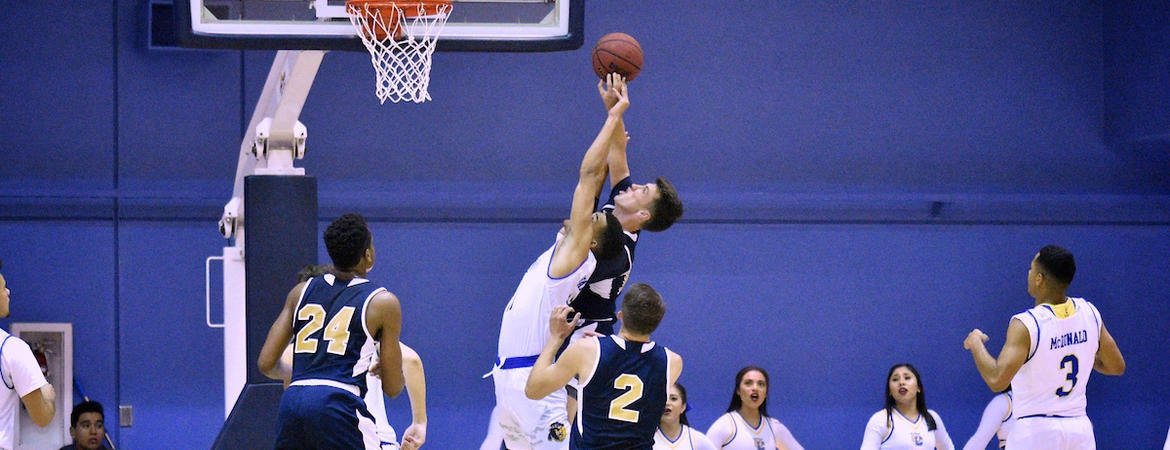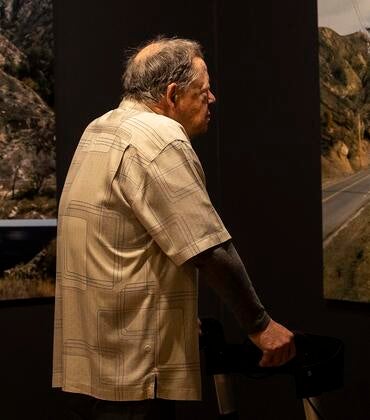
A new interdisciplinary research center at the University of California, Riverside, will critically examine the experiences of athletes across all levels of competition with the aim of driving education, outreach, and advocacy in the field.
Housed within UCR’s Graduate School of Education, the Center for Athletes’ Rights and Equity makes the case for athletes’ rights as a civil rights issue, emphasizing the crucial need for scientific research on athletes’ experiences to enhance their safety and well-being.
Eddie Comeaux, the center’s founding director, is an associate professor of higher education at UCR and expert in intercollegiate athletics, racial equity and policy issues, and college student engagement.
“I don’t just study athletes,” Comeaux said. “I study students who happen to be athletes.”
Through his work with the center, Comeaux said he hopes to push back against false cultural narratives of athletes — and specifically college athletes — as anti-intellectual “dumb jocks” who have an unearned sense of entitlement or are simply lazy.
In fact, athletes in big-time college sports are especially vulnerable to an exploitative structural arrangement, Comeaux said.
He’s interested in not only helping them better understand their personal rights and educational goals, but also navigate the legal and financial gray areas that often accompany segueing into professional athletics. With that in mind, the center’s efforts will seek to address issues of equity, fairness, inclusion, and justice for athletes both at the high school and college levels and beyond.
Those issues include the fight for fair compensation, which in California crystallized into a legislative matter tow years ago with the passage of Senate Bill 206, widely known as the Fair Pay to Play Act.
Proposed by Democratic Sen. Nancy Skinner of Berkeley, the bill was staunchly opposed by the NCAA, University of California, and California State University. Nevertheless, it was signed into law by Gov. Gavin Newsom in Sept. 2019 and will go into effect in 2023.
Though it still forbids schools from paying athletes directly, once fully implemented, SB 206 will make it illegal for universities to revoke athletes’ scholarships or eligibility if they seek to profit off their name, image, or likeness.
Beginning in summer 2019, Comeaux traveled to Sacramento to help Sen. Skinner lobby legislators in favor of the bill’s passage. He said the experience motivated him to become more involved in policy research and advocacy to benefit athletes — now key objectives of the center.
“I’ve always been a fierce advocate for disrupting the status quo and systems that don’t support and benefit the most vulnerable communities,” Comeaux said.
He noted another issue that remains to be addressed on campuses is gender equity, especially when it comes to women — and women of color, in particular — ascending to senior leadership roles such as athletics directors. Moreover, on many campuses men’s athletics programs continue to receive significantly more funding than women’s programs, including for recruitment activities and scholarships, Comeaux said.
Comeaux’s background largely influences his interest in issues affecting athletes. A former Division I college athlete, he was drafted by the Texas Rangers while playing baseball at UC Berkeley. He spent four years playing professionally before earning his master’s degree and doctorate from UCLA.
Comeaux said one of the focus-shifting moments of his academic career came during his undergraduate years, when he met the man who would become his mentor: Dr. Harry Edwards.
Edwards, now a UC Berkeley professor emeritus of sociology, was a leading sports sociologist and civil rights activist — a former Black Panther who, beginning in 1967, had orchestrated the Olympic Project for Human Rights to protest racial injustice, including in athletics.
“Everything he talked about seemed to resonate with me,” Comeaux said of Edwards. “That was when I first realized I could make a career out of studying athletes.”
Comeaux believes universities can play an important role in preparing athletes for life after sports. For many athletes, he said, retirement entails both a career transition and a shift in personal identity, and the process is sometimes complicated by injuries that require long recoveries.
To help ease the transition, Comeaux has begun building a suite of informational programming — workshops and development seminars for athletes geared toward everything from financial literacy to hiring an agent.
Ultimately, his goal is to present the programming to athletes through the center. But in its first year of operation, Comeaux said he hopes to focus on cultivating new partnerships between the center and professional sporting organizations in Southern California.
In addition, he plans to kick off the center’s activities by recruiting and supporting UCR graduate students and postdoctoral fellows in their research on college athletes.
“Colleges need to figure out how to intentionally maximize athletes’ learning and prepare them for their next steps after they graduate,” Comeaux said. “Our work should be geared toward centering equity issues to create a more level playing field for all athletes.”



